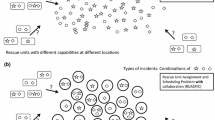Abstract
The Second Generation Expert Systems approach begins to be widely used in areas such as diagnosis. In this paper, we will demonstrate its potential use to solve real-world problems in planning. This approach is illustrated by an expert system that builds restoration plans after a failure on a power transmission network. Organized around a blackboard, it integrates planning knowledge sources containing restoration expertise, a qualitative model used to predict the results of the plan, and a quantitative model used to verify the correctness of the plans towards numerical constraints. We will describe the benefits of this architecture for emergency planning systems, and the possibilities offered by the coupling of models and heuristics, for instance to reason with incomplete information.
Access this chapter
Tax calculation will be finalised at checkout
Purchases are for personal use only
Preview
Unable to display preview. Download preview PDF.
Similar content being viewed by others
References
C. Benoit, M. Bidoit, L. Henninger, R. Velly: LORE: an Object-based Programming Environment, TOOLS 89, Paris, november 1989
J.C. Bonnet, M. Uszynski: RAMSES: a Second Generation Expert System for Train Maintenance, Avignon 89, specialized conference on Second Generation Expert Systems
B. Chandrasekaran: Towards a functional architecture for intelligence based on generic information processing tasks, IJCAI87, Milan 1987
D. Chapman: Planning for Conjunctive Goals, AI Journal, Vol. 32, 1987
J.M. David, J.P. Krivine: Designing Knowledge-based Systems within Functional Architecture: the DIVA Experiment, CAIA89, Miami 1989
R. Davis: Diagnostic Reasoning based on Structure and Behaviour, Artificial Intelligence 24, 1984
T. Dean, M. Boddy: An Analysis of Time-Dependant Reasoning, AAAI 88, Saint Paul, Minnesota, 1988
R. Engelmore, T. Morgan: Blackboard Systems — Addison Wesley 1988
H. Fargier, O. Paillet: A Framework for Blackboard Applications, AAAI Workshop on Blackboard Systems, AAAI 91, Anaheim, 1991
R. Fikes, N. Nillson: STRIPS, a New Approach to the Application of Theorem Proving to Problem-Solving, Artificial Intelligence n.2, 1974
S. Feray-Beaumont, S. Gentil, L. Leyval: Declarative modelling for process supervision, Revue d’Intelligence Artificielle, Vol.3, n.4, 1989
P. Fink: Control and integration of Diverse Knowledge in a Diagnostic Expert System, IJCAI 85
B. Hayes-Roth, F. Hayes-Roth, S. Rosenschein, S. Cammarata: Modeling Planning as an Incremental, Opportunistic Process — IJCAI 79
B. Hayes-Roth: A Blackboard Architecture for Control-Artificial Intelligence, Vol. 26, No3, 1985
M.R. Herbert, G.H. Williams: An Initial Evaluation of the Detection and Diagnosis of Power Plant Faults using a Deep Knowledge Representation of Physical Behaviour, Expert Systems, Vol.4, n.2, May 1987
F. Jakob, P. Suslenschi: Situation Assessment for Process Control, Robotics and Computer-Integrated Manufacturing, Vol.3, n.2, 1987
A. Paterson, P. Sachs, M. Turner: ESCORT: the Application of Causal Knowledge to Real-time Process Control, Expert Systems 85, Cambridge University Press, 1985
W. Swartout ed.: DARPA Santa Cruz Workshop on Planning, AI Magazine, Summer 1988
Hwee Tou Ng: Model-based, Multiple-Fault Diagnosis of Dynamic, Continuous Physical Devices, IEEE Expert, December 1991
D. Wilkins: Domain Independant Planning: Representation and Plan Generation, Artificial Intelligence n.22, 1984
Author information
Authors and Affiliations
Editor information
Editors and Affiliations
Rights and permissions
Copyright information
© 1993 Springer-Verlag Berlin Heidelberg
About this paper
Cite this paper
Paillet, O. (1993). Multiple Models for Emergency Planning. In: David, JM., Krivine, JP., Simmons, R. (eds) Second Generation Expert Systems. Springer, Berlin, Heidelberg. https://doi.org/10.1007/978-3-642-77927-5_9
Download citation
DOI: https://doi.org/10.1007/978-3-642-77927-5_9
Publisher Name: Springer, Berlin, Heidelberg
Print ISBN: 978-3-642-77929-9
Online ISBN: 978-3-642-77927-5
eBook Packages: Springer Book Archive




